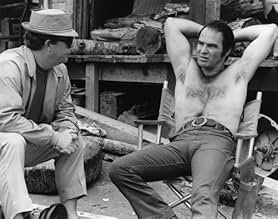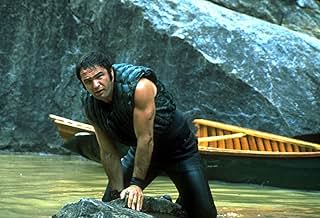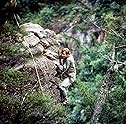कहुलावासी नदी को देखने के इरादे से इससे पहले कि यह बांध दिया गया है और एक झील में बदल गया है, आउटडोर कट्टरपंथी लुईस मेडलॉक अपने दोस्तों को एक कैनोइंग यात्रा पर ले जाता है जो वे खतरनाक अमेरिक... सभी पढ़ेंकहुलावासी नदी को देखने के इरादे से इससे पहले कि यह बांध दिया गया है और एक झील में बदल गया है, आउटडोर कट्टरपंथी लुईस मेडलॉक अपने दोस्तों को एक कैनोइंग यात्रा पर ले जाता है जो वे खतरनाक अमेरिकी बैक-कंट्री में कभी नहीं भूलेंगे।कहुलावासी नदी को देखने के इरादे से इससे पहले कि यह बांध दिया गया है और एक झील में बदल गया है, आउटडोर कट्टरपंथी लुईस मेडलॉक अपने दोस्तों को एक कैनोइंग यात्रा पर ले जाता है जो वे खतरनाक अमेरिकी बैक-कंट्री में कभी नहीं भूलेंगे।
- 3 ऑस्कर के लिए नामांकित
- 2 जीत और कुल 14 नामांकन
फ़ीचर्ड समीक्षाएं
I think one of the words that most describes the events in this film to me is brutal. When I saw this as a young lad, I felt the isolation of the four characters, cut-off from the world they are used to and thrown into a brutal world where nature is harsh (the rocks and canyons along the river always scare me) and the local folk are a complete world away. The film still scares the sh*t out of me! I mean, what would YOU do if you were confronted by two hill-billies in a situation like that?
It's so easy to remain distant and see the film as "entertainment", but take a reality-check and immerse yourself in the story. It's a shame some just don't appreciate the film - guess we're used to adrenaline-pumping action from start to finish nowadays, but that's too easy - it doesn't require emotional involvement from the viewer unlike a film such as Deliverance...
It's so easy to remain distant and see the film as "entertainment", but take a reality-check and immerse yourself in the story. It's a shame some just don't appreciate the film - guess we're used to adrenaline-pumping action from start to finish nowadays, but that's too easy - it doesn't require emotional involvement from the viewer unlike a film such as Deliverance...
I hadn't seen this movie in at least 20 years, but in the last few, it had started to itch away at my mind. I thought it terrific when I first saw it, but had I missed something even so? Was it more than just a disturbing adventure movie, in which city people run afoul of backwoodsmen?
So as soon as I saw the DVD, I bought it, even though it was obviously another Warner Bros. rush-it-out, never-mind-the-extras job.
The movie isn't as good as I remembered -- it's better. Those who are looking for a RIVER WILD thriller, or a SOUTHERN COMFORT (a DELIVERANCE imitation) suspense movie, are already looking in the wrong place. This movie is about what goes on inside people much more than it is about what goes on >around< them.
I've seen comments here suggesting that Ned Beatty doesn't show enough reaction after being brutally raped. Huh? He's stunned for ten minutes, then tries to attack Bill McKinney's >corpse<. He's still rattled the last time we see him in the movie, when he tells Jon Voight that they won't be seeing each other for a while. (Which clearly means forever.) Beatty's life has been changed; he'll never get over it.
So has Voight's, but in a different way. For the first time, I noticed that >three< people get into the tow truck when Reynolds hires those brothers to drive their cars to the canoeist's destination. Sure, that's logical -- there are three vehicles to drive initially, after all. But why does Boorman take pains to avoid showing us the face of the third person in the tow truck, but does show him fingering the gun in the rear window of the truck?
Could it be because this guy turns up later? Is he Bill McKinney's character? Or the Toothless guy? Or the guy Voight kills? Which of course raises the most important questions in the movie: WAS Ronny Cox shot? And if he was, was the guy Voight kills the one who shot him? (And was Voight's victim the Toothless guy?) On an initial viewing of the movie, all this seems pretty obvious: yes, Cox is shot; yes, Voight kills the right person, the Toothless guy.
But then what about the man we later learn has gone hunting but who hasn't returned? Why is Voight so shocked when he looks into the mouth of his victim? Boorman and Dickey give great weight to the scene in which Voight fails to kill a deer. (Even if he had, it would have been a foolish, wasteful act.) The interplay between Voight and Reynolds is also very interesting; Voight clearly admires Reynolds on some levels, while finding him disgusting on others.
Dickey is primarily a poet, secondarily a novelist; it's not hard to believe that he intended all four men to represent different aspects of the human condition. DELIVERANCE is one of the most intricately ambiguous movies of its type ever made; it cannot be pulled apart into easily-understood sections, and where our sympathies should lie is never obvious. Even the sheriff, played by Dickey himself, has darker shadings that are partly inexplicable. And there is that shot of the removal of the graves; it's not in there by chance or for local color.
On the surface, DELIVERANCE seems to be an exciting, disturbing adventure -- and it is that. But just like the secrets the lake conceals, there's a great deal more beneath the surface of DELIVERANCE.
So as soon as I saw the DVD, I bought it, even though it was obviously another Warner Bros. rush-it-out, never-mind-the-extras job.
The movie isn't as good as I remembered -- it's better. Those who are looking for a RIVER WILD thriller, or a SOUTHERN COMFORT (a DELIVERANCE imitation) suspense movie, are already looking in the wrong place. This movie is about what goes on inside people much more than it is about what goes on >around< them.
I've seen comments here suggesting that Ned Beatty doesn't show enough reaction after being brutally raped. Huh? He's stunned for ten minutes, then tries to attack Bill McKinney's >corpse<. He's still rattled the last time we see him in the movie, when he tells Jon Voight that they won't be seeing each other for a while. (Which clearly means forever.) Beatty's life has been changed; he'll never get over it.
So has Voight's, but in a different way. For the first time, I noticed that >three< people get into the tow truck when Reynolds hires those brothers to drive their cars to the canoeist's destination. Sure, that's logical -- there are three vehicles to drive initially, after all. But why does Boorman take pains to avoid showing us the face of the third person in the tow truck, but does show him fingering the gun in the rear window of the truck?
Could it be because this guy turns up later? Is he Bill McKinney's character? Or the Toothless guy? Or the guy Voight kills? Which of course raises the most important questions in the movie: WAS Ronny Cox shot? And if he was, was the guy Voight kills the one who shot him? (And was Voight's victim the Toothless guy?) On an initial viewing of the movie, all this seems pretty obvious: yes, Cox is shot; yes, Voight kills the right person, the Toothless guy.
But then what about the man we later learn has gone hunting but who hasn't returned? Why is Voight so shocked when he looks into the mouth of his victim? Boorman and Dickey give great weight to the scene in which Voight fails to kill a deer. (Even if he had, it would have been a foolish, wasteful act.) The interplay between Voight and Reynolds is also very interesting; Voight clearly admires Reynolds on some levels, while finding him disgusting on others.
Dickey is primarily a poet, secondarily a novelist; it's not hard to believe that he intended all four men to represent different aspects of the human condition. DELIVERANCE is one of the most intricately ambiguous movies of its type ever made; it cannot be pulled apart into easily-understood sections, and where our sympathies should lie is never obvious. Even the sheriff, played by Dickey himself, has darker shadings that are partly inexplicable. And there is that shot of the removal of the graves; it's not in there by chance or for local color.
On the surface, DELIVERANCE seems to be an exciting, disturbing adventure -- and it is that. But just like the secrets the lake conceals, there's a great deal more beneath the surface of DELIVERANCE.
Deliverance is the fascinating, haunting and sometimes even disturbing tale by James Dickey, turned into a brilliant movie by John Boorman. It's about four businessmen, driven by manhood and macho-behavior, who're spending a canoeing weekend high up in the mountains. Up there, they're faced with every darkest side of man and every worst form of human misery...poverty, buggery and even physical harassment! These four men intended to travel down the river for adventure and excitement but their trip soon changes into an odyssey through a violent and lurking mountain-land, completely estranged from all forms of civilisation. All these elements actually make Deliverance one of the most nightmarish films I've ever seen. Just about everything that happens to these men, you pray that you'll never find yourself to be in a similar situation. Pure talking cinema, Deliverance is a very important movie as well. John Boorman's best (closely followed by Zardoz and Excalibur) was - and still is - a very influential film and it contains several memorable scenes that already featured in numberless other movies. Just think about the terrific "Duelling banjos" musical score and, of course, the unforgettable homosexual "squeal like a pig" rape scene. All the actors deliver (haha) perfect acting performances. Especially Jon Voight. A must see motion picture!!
True masterpiece genuinely done; very dark adventurous story about a group of men that are stuck in a situation after some creepy guys do some awful things and things spiral more from there! The sound editing & cinematography alone make this a wonderful experience along with a great cast!
I thoroughly enjoyed this menacing adventure; I'm sure it was difficult to make too. Movies aren't made like this anymore, so it's definitely nice to see this gem.
I thoroughly enjoyed this menacing adventure; I'm sure it was difficult to make too. Movies aren't made like this anymore, so it's definitely nice to see this gem.
You plan a trip, along a river, in two canoes, a tricky navigation, but you'll get through, Lewis knows about these things, how the world revolves and spins, what could possibly go wrong, enjoy the view. Part way down you're separated and you moor, you and Bobby meet two locals and endure, an assault that makes one jig, as Bobby squeals like a split pig, it leaves you outraged, full of disgust and rancour. The situation takes a turn because of Lewis, as he saves you from the gorge that's now an abyss, you escape and speed down river, this adventure's not delivered, these are times, you will not fondly reminisce.
As good as it was all those years ago, and perhaps even better as it's aged, with four great performances, that to this day, would leave you contemplative when adventuring in certain under explored parts of the country.
As good as it was all those years ago, and perhaps even better as it's aged, with four great performances, that to this day, would leave you contemplative when adventuring in certain under explored parts of the country.
क्या आपको पता है
- ट्रिवियाWhile filming the white water canoeing scene, Ned Beatty was thrown overboard and was sucked under by a whirlpool. A production assistant dove in to save him, but he didn't surface for thirty seconds. Sir John Boorman asked Beatty, "How did you feel?," and Beatty responded, "I thought I was going to drown, and the first thought was, how will John finish the film without me? And my second thought was, I bet the bastard will find a way!"
- गूफ़When the cedar strip canoe breaks in half ((01:02:35), it breaks cleanly, indicating it was previously cut. It would have split, splintered and hinged together by the canvas skin.
- क्रेज़ी क्रेडिटThe end credits only show the cast and a notice of where the location of the film was shot and the special thanks, which rolls over a shot of Ed and his wife laying down trying to sleep. It also shows the shot of the lake where the hand ascended up out of the water and the final credit reads 'Distributed by WARNER BROS'
- इसके अलावा अन्य वर्जनThe original UK cinema version suffered minor BBFC cuts, including the removal of two lines of dialogue said by the toothless man when threatening Ed after the rape scene, "He got a real pretty mouth, ain't he?" and "You got to do some praying for me, boy, you better pray real good." Also, the death of the mountain man where he is seen struggling with the arrow through his chest was reduced. All later video releases were uncut.
- कनेक्शनEdited into La classe américaine (1993)
- साउंडट्रैकDuelling Banjos
Written by Arthur Smith (uncredited)
Arranged and played by Eric Weissberg, Steve Mandell
टॉप पसंद
रेटिंग देने के लिए साइन-इन करें और वैयक्तिकृत सुझावों के लिए वॉचलिस्ट करें
विवरण
बॉक्स ऑफ़िस
- बजट
- $20,00,000(अनुमानित)
- दुनिया भर में सकल
- $4,550
- चलने की अवधि
- 1 घं 49 मि(109 min)
- रंग
- पक्ष अनुपात
- 2.35 : 1
इस पेज में योगदान दें
किसी बदलाव का सुझाव दें या अनुपलब्ध कॉन्टेंट जोड़ें
































